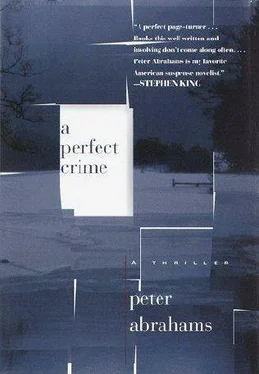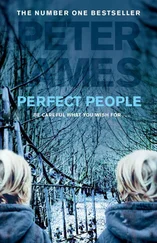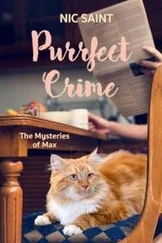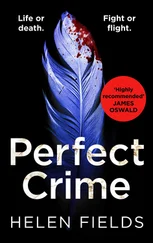Peter Abrahams - A Perfect Crime
Здесь есть возможность читать онлайн «Peter Abrahams - A Perfect Crime» весь текст электронной книги совершенно бесплатно (целиком полную версию без сокращений). В некоторых случаях можно слушать аудио, скачать через торрент в формате fb2 и присутствует краткое содержание. Жанр: Триллер, на английском языке. Описание произведения, (предисловие) а так же отзывы посетителей доступны на портале библиотеки ЛибКат.
- Название:A Perfect Crime
- Автор:
- Жанр:
- Год:неизвестен
- ISBN:нет данных
- Рейтинг книги:4 / 5. Голосов: 1
-
Избранное:Добавить в избранное
- Отзывы:
-
Ваша оценка:
- 80
- 1
- 2
- 3
- 4
- 5
A Perfect Crime: краткое содержание, описание и аннотация
Предлагаем к чтению аннотацию, описание, краткое содержание или предисловие (зависит от того, что написал сам автор книги «A Perfect Crime»). Если вы не нашли необходимую информацию о книге — напишите в комментариях, мы постараемся отыскать её.
A Perfect Crime — читать онлайн бесплатно полную книгу (весь текст) целиком
Ниже представлен текст книги, разбитый по страницам. Система сохранения места последней прочитанной страницы, позволяет с удобством читать онлайн бесплатно книгу «A Perfect Crime», без необходимости каждый раз заново искать на чём Вы остановились. Поставьте закладку, и сможете в любой момент перейти на страницу, на которой закончили чтение.
Интервал:
Закладка:
Not quite a question mark, because he knew that some action was required. She had come into their house-his house, his ancestral house-with another man’s sperm inside her, perhaps many, many times. Another man’s sperm: a vulgar, dirty, contemptuous betrayal, almost slimy, like a plot development in one of those movies about alien beings in human shape. Another man’s sperm-what a primitive fixation she had with the substance, on reflection-inside her, and she talking and smiling away at him. Smile and be a villain, Francie. There was no fixing anything now, no going back. And what was society’s answer? No-fault divorce. If this were Sicily, or Iran, countless other places, he could now-what? Kill her with impunity. A crime of passion, almost expected. Divorce implied nothing more than absence of affection, lack of feeling. Therefore divorce did not apply. He felt. He felt the opposite of everything husband should feel for wife. She was his enemy, had proved him wrong in one of the basic decisions of life, whom to marry. What action was appropriate? Question mark.
Not quite a question mark. Deep in his mind, did he not already know the answer must be related to that penny dropping off the Empire State Building? Yes. The conclusion awaited, long before the thinking was done. But slow: this was not Sicily or Iran. America, land that had deteriorated so much as he grew older, had failed him so badly. Slow: there would be many steps along the way, down and down toward that coppery glint. And every step must be a careful step, all planning, all preparation thought and rethought.
For example, on the front seat beside him sat the damaged painting and Francie’s note. To Ned, with all my love, Francie. His mind writhed away from the words. Get back on track, one thought, one thought. The painting, the note. Too risky to hide them in the house and he no longer had an office. Was there any other space over which he held exclusive control? The answer came at once, probably because of the morning’s business with the keys: his locker at the tennis club.
Step one, then. There were two kinds of lockers at the club: full-size metal ones in the locker room, and half-size wooden ones lining the thickly carpeted hall that led to the courts. Because of his dislike for showering at the club, Roger had taken a locker in the hall. He walked to it now, the painting wrapped in the scraps of brown paper he’d salvaged, note tucked inside, and unlocked the door with his key. Inside he found equipment he’d forgotten about-racquets, cans of balls, tennis shoes, towels. No room for the painting. He put the painting down, the brown paper unfurling, glanced around, saw no one, took everything out of the locker, picked up the painting, rewrapped it imperfectly, one corner protruding, and was just placing it inside when a female voice spoke right behind him. “Roger?”
He slammed the door shut, wheeled around, saw a big woman in a purple warm-up suit, a pair of racquets slung over her shoulder. “Oh. Nora.” Not very smooth, perhaps, possibly lacking in friendliness, so he added, “Hello. Nice to see you.”
“Likewise. I didn’t know you were playing again.”
“Playing again?” How to handle this situation? He looked at her: only Nora, after all, a jock, not very bright; he’d never understood what Francie saw in her. “Thinking about it, in any case,” he said. “Come to reintroduce myself to the gear. Shake hands with my racquet.” A witticism-shaking hands with the racquet was the age-old introduction to the forehand grip. He laughed.
Nora didn’t. Her brow, in no way noble, or even intelligent, wrinkled. Must I explain the goddamned joke? Roger was thinking, when three women came down the hall on their way to the courts, talking woman-talk. “Say hi to Francie,” Nora said, joining them.
“Will do,” said Roger with a smile, turning the key in his locker, then trying the handle twice to make sure it was locked.
Driving home, Roger fought the urge to stamp down on the gas, to smash the cars around him. On track, stay on track, use your brain. He used it to think about crime.
Roger knew that people sometimes got away with crime, but did any of them necessarily do so? Or did they simply rely, tacitly or explicitly, on sloppy police work, nonexistent police work, luck? He considered luck. A person could be taken on a cruise ship, for example, invited for a glass of champagne on a deserted stern deck at night, pushed over the rail. It might work, but was it teleologically guaranteed to do so? Of course not. Someone might be sitting in the shadows, obscured by a lifeboat, and witness the whole thing. Or the falling person might cry out, attract a quick glance through a porthole or from someone on a lower deck, leading to alarms, searchlights, rubber boats crisscrossing the wake. The person might even fall unnoticed but then happen on a piece of driftwood, cling to it until dawn, be rescued by a fishing boat. Therefore the cruise ship scenario, attractive because no body and therefore no evidence is found, required luck, would not succeed of necessity, was far from perfect.
Calmer now, Roger was in no way downcast by the negative result of this speculation. Quite the opposite, if anything, for all at once he was hungry and thirsty, his appetite keener than it had been for a long time. He pulled into a suburban steakhouse, the kind of place he would never enter-wagon wheel by the door, cowboy pictures on the wall-and ordered a big steak and a double Scotch on the rocks. What was this strange feeling bubbling up inside him, strange but not quite forgotten? He put a name to it: enthusiasm. And in the next moment he realized with a shock-ironic, unsettling, but finally pleasant-that he had found a job at last.
“I’ll have another,” he said to the waitress.
“Another drink, sir?”
“Another of everything.”
“Including the garlic bread?”
“Pourquoi pas?”
“I’m sorry?”
“Yes, garlic bread by all means.”
Accidents, he thought, chewing his food with relish, trying to keep pace with his mind. Tampering with brakes, with steering rods, with ovens, with furnaces, with ski bindings all required technical knowledge; all carried the risk that evidence of tampering might remain. And if tampering was suspected, the first suspect would be the spouse.
Roger removed the round paper napkin from under his glass, wrote on it: poison-no-expertise, traces contract killer-no-in his power arson (house)-no-evidence-accelerant infection (injection?) with some disease “Care for anything else, sir?”
Roger slid his hand over the napkin. “Just the check.”
The waitress went off. Roger raised his hand slightly to peek at the napkin, like a poker player checking his hole card. The disease idea. Pro: like an accident, it provided a credible noncriminal explanation for death. Con: it required expertise, a disease not readily contagious yet fast-acting and certain. No, he wrote beside it, but reluctantly. He paid his bill, went into the bathroom, tore up the napkin, flushed the shreds down the toilet, got in his car, started home. He had gone a few blocks when he made a sudden U-turn and sped back to the restaurant. What if some scrap of the napkin was still floating in the toilet bowl? He hurried inside-“anything the matter, sir?” said the waitress-strode into the bathroom, peered into the toilet. Nothing but water; he flushed it again anyway, just to be safe.
“Francie?” he called, entering the house on Beacon Hill; their house, under the laws of the Commonwealth, but his by moral right, since he had inherited it from his grandparents. No answer. He went into the kitchen, saw her purse still on the table and a stack of mail, some opened, on the desk. He riffled through it, found a letter from Tad Wagner: Please find a copy of your coverage statement. Once again, thanks so much, and if I can be…
Читать дальшеИнтервал:
Закладка:
Похожие книги на «A Perfect Crime»
Представляем Вашему вниманию похожие книги на «A Perfect Crime» списком для выбора. Мы отобрали схожую по названию и смыслу литературу в надежде предоставить читателям больше вариантов отыскать новые, интересные, ещё непрочитанные произведения.
Обсуждение, отзывы о книге «A Perfect Crime» и просто собственные мнения читателей. Оставьте ваши комментарии, напишите, что Вы думаете о произведении, его смысле или главных героях. Укажите что конкретно понравилось, а что нет, и почему Вы так считаете.












